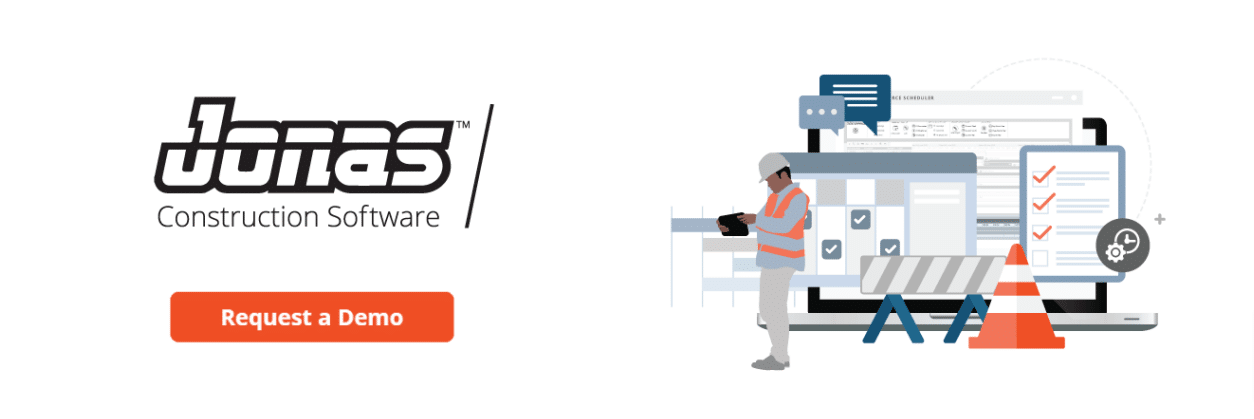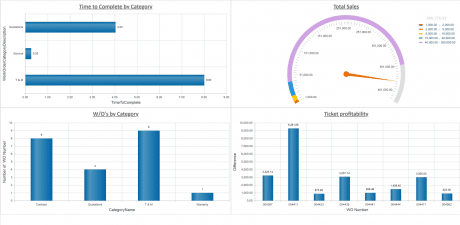Last Updated on July 17, 2023

As a construction company, the last thing you want is to overpay your bills! It’s simple math – the greater your costs the lower your revenue. However, construction and service companies often deal with hundreds of invoices. With so many invoices on the go, invoices can get lost, payment terms can get confused, and late charges can accrue.
The best way to avoid overpaying is to effectively manage your construction accounts payable. In this article, we’re taking a look at what an effective construction accounts payable process looks like and essential tips for improving your process to ensure payments are accurate and on time.
What is Accounts Payable in Construction?

Typically, construction companies wait to receive payment from customers before paying their bills. Instead of paying your project bills out of pocket, you probably want to wait until you receive payment to cover your project costs. This means that invoices often sit around unpaid for a short period of time. In construction accounting, your accounts payable (A/P) are the bills that you have received from vendors or contractors that you have yet to pay.
Basically, your accounts payable represents your obligation to pay off your short-term debts. This account includes all of your costs, including overhead, direct, and indirect costs. Over time, your number of outstanding bills will fluctuate. However, you’ll receive invoices for overhead costs and general business expenses on a regular basis.
Keeping track of your accounts payable total is essential because you want to ensure that you bring in enough cash flow to cover your expenses. You don’t want to be in a situation where your expenses are higher than your income!
What is Involved in the Construction Accounts Payable Process?
To help you ensure that you are preparing and processing your accounts payable properly, here’s a snapshot of the construction AP process.
- Create your chart of accounts: Before you can even consider improving your construction accounts payable process, you’re going to need a good chart of accounts. This is where all of your accounting transactions will reside.
- Set up your vendor terms & details: How much time do your vendors or suppliers give you to pay your bills? This will vary from vendor to vendor and supplier to supplier.
- Ensure your invoices are accurate & enter the invoice information: You don’t want to pay for services that were not performed! Ensure that services were completed as described on the invoices before you enter the information into your system.
- Process invoice payments: Issue a cheque or electronic payment for the amount due on or before the specified due date.
So, there’s your construction accounts payable process! Seems pretty straightforward, right? Maybe not…
How to Improve Your Construction Accounts Payable Process

There are still a few things you should know that will make your construction accounts payable process run smoother. Here are a few ways to improve your process so you can focus on running your business without getting caught up in misplaced invoices and unpaid bills.
1. Maintain a Single Point of Entry for All Invoices
One of the biggest accounts payable mistakes that construction companies face is allowing multiple team members to collect invoices. This is the #1 cause of misplaced invoices and late payments. Allowing vendors to send invoices via fax is another common cause of lost invoices and late charges. Having multiple entry points for your invoices can also confuse your vendors and leave them unsure about where to submit invoices.
One way to resolve this issue is to encourage vendors to send invoices to a single designated email address or another virtual point of entry. This will allow you to easily track when invoices have been received and recall and reprint invoices should they go missing, so all bills get paid on time.
2. Go Paperless
Going paperless with your accounts payable process is along the same line as ensuring all of your invoices are submitted via email. The simple fact is that papers get lost. As much as you may try to keep your paper invoices and cheques organized, this is simply an outdated system that puts your business at unnecessary risk.
The future is digital! Integrated construction accounts payable software allows you to easily save digital copies of your invoices. Even if you’re using email to collect invoices, they can be difficult to retrieve and find in a crowded inbox. Saving copies to your software system ensures that your invoices will always be easy to find and you’ll always have a clear picture of job costs.
Enter your invoices into your software as you receive them and before starting approval processes. Staying on top of your invoice entry ensures you’ll never be stuck searching for an invoice or left in the dark about your job costs again.
3. Keep Track of the Terms of Your Invoices
As we discussed above, keeping track of invoice terms is important because it will vary from vendor to vendor. Terms are the amount of time that a vendor or supplier gives you to pay an invoice. If a vendor gives you 90 days to pay an invoice, you want to submit a payment within that timeframe so you don’t incur a penalty. Sometimes, suppliers might even offer you discounts for submitting a payment early. However, not every vendor or supplier will give you the same timeframe to pay an invoice. Here are some of the most common terms you may see:
- Net X: Payment is due X days after the invoice date (ex. Net 30 = payment due 30 days after invoice date).
- EOM: Payment is due at the end of the month.
- Upon Receipt: Payment is due immediately once the invoice is received.
- X MFI: Payment is due on the X of the month following the invoice date (ex: 15 MFI= payment due on the 15th day of the month following the invoice date)
- PIA: Payment is due before the work is completed.
Keeping track of the terms of your invoices is essential so you can ensure invoices are paid on time, you avoid late penalties, and you can take advantage of any cost savings. Construction accounts payable software makes it much easier to keep track of terms and invoice due dates, so you never have to worry about late payments again.
With larger projects, you may also have the opportunity to negotiate your payment terms, so you avoid situations where you might need to pay your invoices out of pocket. Keep this in mind before signing any contracts.
4. Stick to a Routine
The best way to ensure your recurring bills are paid on time is to stick to a routine. Run accounts payable reports (i.e. outstanding invoices, list of all your payables, your cheque run, etc.) on a routine basis and pay your bills on a routine schedule. You may wish to do your payables at the same time as your payroll, so you are generating all of your recurring payments at the same time. When you create habits, nothing gets lost!
But what about one-time payments? When you have hundreds of one-time payments with varying terms on the go, it’s much easier for things to fall through the cracks. This means that your payment routines will look a bit different. Construction accounts payable software (like Jonas Construction) allows you to set payment due dates when you enter your invoices into the software. This allows you to filter your invoices by the due date and ensures invoices are paid within the specified timeframe. Regularly sorting and paying invoices based on their due date is an important routine that will prevent any bills from getting missed. Or better yet – allow AP automation to do the work for you. We’ll discuss this in the next section.
Filtering your invoices by their due date is also a great way to find out how much you owe at any given time. This information is crucial for job costing and ensuring you’re billing the appropriate amount to cover your costs.
5. Automate Your Accounts Payable With Construction Accounting Software
Finally, the best way to solve all the issues you face related to construction accounts payable (missing invoices, late payments, late fees, etc.) is to automate your accounts payable process.
Save time and resources and better manage the hundreds of invoices associated with each project with accounts payable automation software. By automating your payments with software, you’ll also protect your cash flow, better manage your bottom line and reduce your operating costs.
Jonas Construction Software Can Help You Streamline Your Accounts Payable Process
What’s the best tool to help you streamline your construction accounts payable process? Jonas Construction Software!
Our account payable module makes paying invoices, selecting appropriate project ledgers, and managing subcontractor and vendor payments a breeze. Our software is fully integrated and offers efficient automation by linking your invoices with your purchase orders and subcontractor agreements, which effectively cuts out errors and reduces time spent on data entry.
Learn more about the Jonas Construction accounts payable software functionality and take the stress off of your accounting team today!







